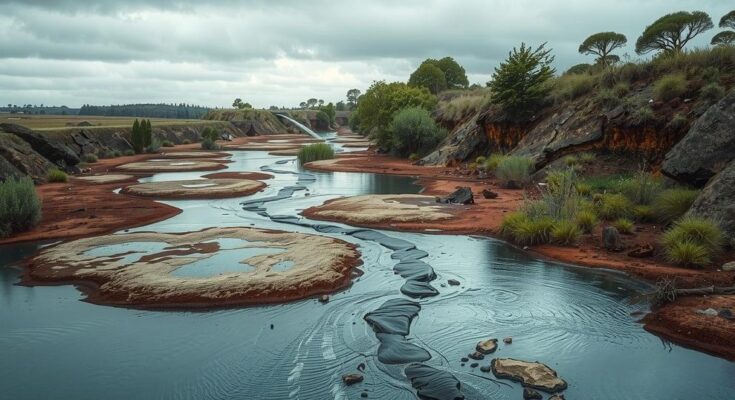Iraq is facing a severe environmental crisis due to crude oil leaks contaminating land and water sources, endangering agriculture and public health. Residents report visible environmental damage in regions like Baiji. The deterioration of older pipelines, exacerbated by past conflicts, continues to impact ecosystems, while insufficient government action compounds the issue. Experts call for a comprehensive approach to tackle the crisis effectively.
Iraq is currently facing a severe environmental crisis as crude oil leaks threaten its agriculture, public health, and overall livelihoods. Oil that was once a source of national pride is now contaminating land and waters, jeopardizing the resources essential for survival, as toxic oil spreads across regions.
In the Baiji district, near the village of Al-Muslaha, locals report environmental devastation with black patches on the ground and foul odors in the air as crude oil seeps into the Tigris River. Mahmoud Al-Qaisi, a former refinery employee, remarked that the government has failed to either exploit the existing oil wells or investigate their conditions, which could have been developed into eco-tourism sites.
The deterioration of Iraq’s infrastructure and the legacy of past conflicts have exacerbated the situation. Ali Khorsheed, former head of the Kirkuk Environment Department, explained that many of the oil leaks stem from old pipelines damaged during the ISIS conflict. These pipelines suffered further sabotage and illegal extraction, leading to substantial spills into the environment.
After regaining territory from ISIS in 2017, efforts were initiated to bury makeshift oil storage tanks they had created. However, as rains fell, toxic oil residues resurfaced, continue to threaten the ecosystem. Despite the value of oil, its accidental release has become a public health hazard, affecting livestock and agriculture significantly.
Residents like Ali Al-Ubaidi have documented harm to both local wildlife and vital water sources. Farmer Saadoun Abdullah shared that extensive agricultural land has been destroyed due to the flow of oil fields, leading to widespread economic losses.
Experts have noted that Iraq lacks a comprehensive approach to manage its oil infrastructure, with deteriorating pipelines, insufficient security, and an absence of investment in marginalized oil fields. Khorsheed asserted that government strategies lean towards temporary fixes rather than addressing the core issues, resulting in a cyclical crisis of oil leaks.
In conclusion, the environmental disaster in Iraq, characterized by recurring oil leaks affecting major rivers like the Tigris, poses significant risks to millions. The ongoing neglect from the government, along with increasing calls for urgent and effective intervention, highlights the urgent need for sustainable solutions to mitigate further environmental damage and safeguard Iraq’s natural resources.
Iraq’s environmental crisis is rooted in pervasive oil spills that threaten public health and agriculture. The lack of effective government action and comprehensive plans to address the deteriorating infrastructure has resulted in recurring ecological damage. Urgent interventions are needed to prevent further degradation and protect the natural resources vital for the Iraqi population’s survival.
Original Source: shafaq.com




